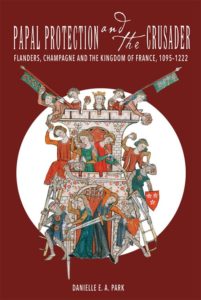Synopsis:
 On taking the cross, crusaders received a diverse set of privileges designed to appeal to both spiritual and more temporal concerns. Among these was the papal protection granted to them and extended over their families and possessions at home.
On taking the cross, crusaders received a diverse set of privileges designed to appeal to both spiritual and more temporal concerns. Among these was the papal protection granted to them and extended over their families and possessions at home.
This book is the first full length investigation of this protection. It begins by examining the privilege from its inception in around 1095, and its development and consolidation through to 1222. It then moves on to illustrate how this privilege operated in practice through the appointments of regency governments and close communication with both the papacy and local ecclesiastical officials, centring on the rich crusading evidence from Flanders, Champagne and the Kingdom of France. While the protection privilege has been seen as unwieldy and over ambitious, close analysis of particular cases and individuals reveals that not only were regents well aware of their privileged status, but that the papacy could directly intervene when its protection was contravened.
On the whole, though, Park argues that the crusade regents did an effective job in upholding the rights of the absentee rulers and that this was recognised when the boss returned- for instance very few of their deeds required re-authentification. The job was eased by what look like conscious attempts to clear the books of outstanding issues before the would-be crusader departed. Park also hints that the constraints of crusade regencies may have been a stimulus for developments in bureaucratic governance.
She has undoubtedly identified an important part of what one might define as the backstage mechanics underlying heroic or ghastly deeds in the Holy Land. Hopefully she may in future widen her focus to consider the fate of those unable to call on the services of Ivanhoe to protect their rights.

No comments:
Post a Comment